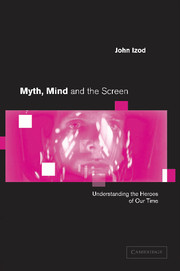Book contents
- Frontmatter
- Contents
- Acknowledgments
- Introduction
- 1 Jungian theory, textual analysis and audience play
- 2 Archetypal images: signification and the psyche
- 3 Archetypal images: symbols and the cultural unconscious
- 4 The Piano, the animus and colonial experience
- 5 The pop star as icon
- 6 The quest of a female hero: The Silence of the Lambs
- 7 Television sport and the sacrificial hero
- 8 The polycentred self: The Passion of Darkly Noon
- 9 Haunted: searching for the whole self
- 10 Transforming the final ghost: the god within
- Conclusion
- Filmography
- Glossary of Jungian and related terms
- References
- Index
7 - Television sport and the sacrificial hero
Published online by Cambridge University Press: 22 September 2009
- Frontmatter
- Contents
- Acknowledgments
- Introduction
- 1 Jungian theory, textual analysis and audience play
- 2 Archetypal images: signification and the psyche
- 3 Archetypal images: symbols and the cultural unconscious
- 4 The Piano, the animus and colonial experience
- 5 The pop star as icon
- 6 The quest of a female hero: The Silence of the Lambs
- 7 Television sport and the sacrificial hero
- 8 The polycentred self: The Passion of Darkly Noon
- 9 Haunted: searching for the whole self
- 10 Transforming the final ghost: the god within
- Conclusion
- Filmography
- Glossary of Jungian and related terms
- References
- Index
Summary
It is rare for the television coverage of sporting heroes to be concerned with aspects of their behaviour and thoughts beyond matters strictly relating to their physical performance. Sometimes sports reports also refer to the psychological preparations which enable athletes to improve that performance, but there is very little else. The main exception to these constraints is found in interviews with sports personalities in which the hopes and fears of the heroes are discussed. Often this format masks a somewhat prurient interest in the emotions experienced by winners and losers. Only very occasionally in the television sports calendar does the commentator's near total concern with physical achievements give way to an uneasy sense that something might be left out by so fixated an approach. However, mainly because a compulsory cultural element accompanies the Olympic Games, such doubts do regularly surface in coverage of their opening and closing ceremonies. On these occasions, broadcasters find themselves obliged to join with the Games' oganisers to make much of the supposed connections between sport and culture. It certainly does disturb momentarily the usually complacent routines of sports reporting.
This chapter takes the ceremonies that bracketed the 1992 Barcelona Olympics as the stimulus prompting a re-examination of the television sporting hero. It begins with a short account of the nature of modern competitive sports and the values typically inherent in television coverage of them.
- Type
- Chapter
- Information
- Myth, Mind and the ScreenUnderstanding the Heroes of our Time, pp. 124 - 142Publisher: Cambridge University PressPrint publication year: 2001



